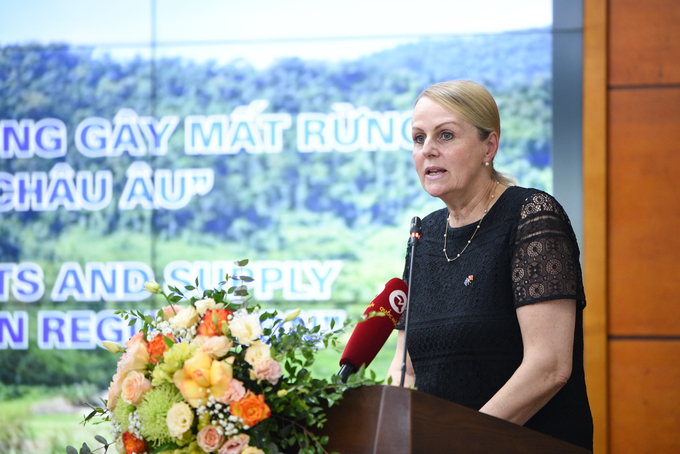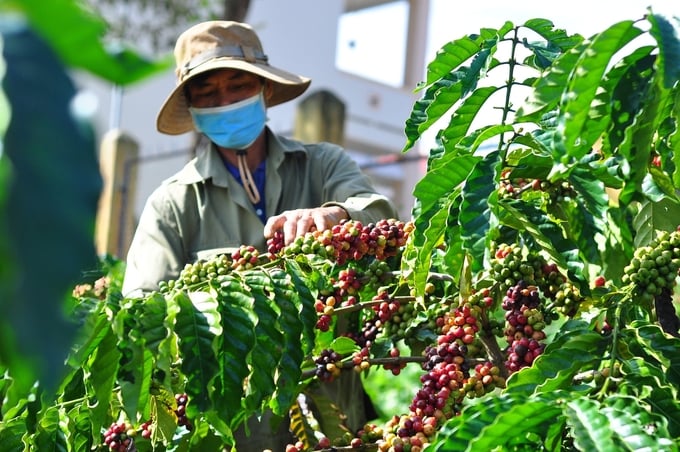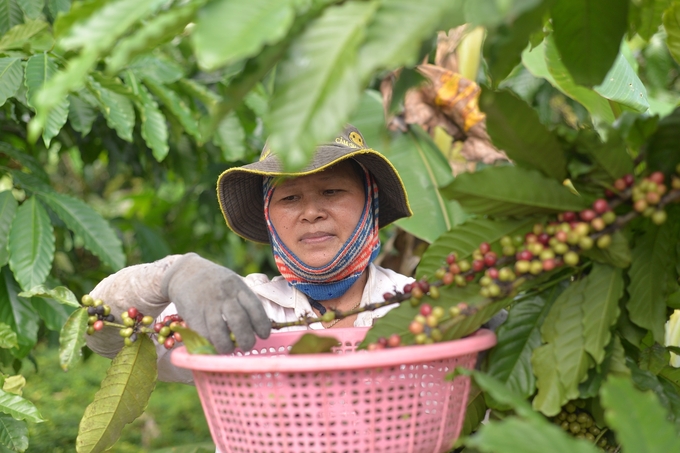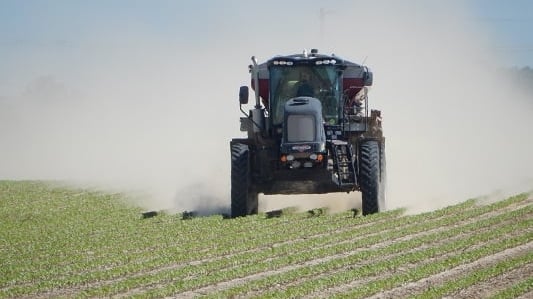May 18, 2025 | 04:23 GMT +7
May 18, 2025 | 04:23 GMT +7
Hotline: 0913.378.918
May 18, 2025 | 04:23 GMT +7
Hotline: 0913.378.918
On June 29, Ms. Florika Fink-Hooijer, Director General of the Environment Department of the European Commission (EC) traveled from Belgium to Vietnam to attend the conference “Deforestation-free coffee production and supply in compliance with European Union regulation” organized by Vietnam’s Ministry of Agriculture and Rural Development (MARD).
On this occasion, the Vietnam Agriculture Newspaper conducted an exclusive interview with Ms. Florika Fink-Hooijer regarding the application and outcome when the EUDR takes effect as well as the EU’s readiness to support Vietnam when implementing the regulation.

Ms. Florika Fink-Hooijer, Director General of the Environment Department of the European Commission (EC) attends the conference at the Ministry of Agriculture and Rural Development. Photo: Tung Dinh.
It is well-known that the EU plays an active role in protecting nature and biodiversity, especially through programs and public policy. Could you share some knowledge and past experiences with preserving forestry, biodiversity, and local people’s livelihood?
The European Union (EU) is committed to protecting natural ecosystems, biodiversity and supporting local communities. The EU has already implemented various programs and policies to preserve forests and safeguard biodiversity both within the EU and in support of global partners, like Vietnam.
Internally, we are working on the basis of a comprehensive EU Biodiversity Strategy, and now we are focusing on implementing the new Global Biodiversity Framework, which we have all agreed to.
Internationally, these efforts translate into close cooperation with partners, both bilaterally and at the multilateral level, notably by working towards protecting land and sea areas to achieve the 30x30 goal, and by tackling some unfinished business, like resource mobilization and access and benefit sharing from digital sequencing information.
European Union Deforestation-free Regulation builds on lessons learned from the FLEGT process and the EU Timber Regulation (EUTR), which outlines obligations for operators who place timber and timber products on the EU market. It will repeal and replace the EUTR, and further improve the existing system.
One of the key benefits of EUTR has been its impact on the transparency of supply chains. Operators must trace the supply from the harvest sites and exercise due diligence before placing the timber product on the EU market to ensure that the timber was harvested legally. The greater availability and flow of information subsequently allow the application of pressure down the supply chain to the original source to ensure logging is legal. This has been confirmed both by stakeholders and science.
Member States have helped to increase awareness of the problem of illegal logging through campaigning and educating operators.
Likewise, the European Commission has published materials to raise awareness of timber legality issues and support Competent Authorities and operators in their work via country overviews and briefing notes.
EU market, finally, acknowledges the significance of local communities in forest-dependent areas. The EU values their traditional knowledge and actively engages them in decision-making processes.
Projects such as the EU REDD Facility support developing countries to improve land-use governance as part of their efforts to conserve forests. By working hand-in-hand with local people, the EU aims to step up conservation efforts and simultaneously improve the well-being of those who depend on forests for their livelihoods.

Ms. Florika Fink-Hooijer affirms that Europe is ready to take measures to support Vietnam in implementing the EUDR. Photo: Minh Hau.
What are some challenges that lawmakers and specialists are facing as EUDR is close to taking effect, i.e. translating definitions from the EU context to the local context in developing countries in general and Vietnam in particular?
With the EU's Deforestation Regulation (EUDR) now in force and becoming applicable at the end of next year, it is important to prepare all those involved in trade of relevant products with the EU (or within the EU) so that their products meet the requirements of the new regulation.
The same rules apply to all products placed on the EU market, irrespectively if they come from EU producers or partner countries.
The new rules broaden the scope of the traceability and due diligence obligations Vietnamese timber producers are already familiar with, to include further commodities frequently associated with deforestation and of which the EU is a significant consumer.
In addition to the legality of production, operators placing these commodities and some derived products on the market will need to prove they do not stem from land deforested after 31 December 2020. This is the date by which all countries committed to halting deforestation as part of the global Sustainable Development Goals.
The EUDR is based on definitions, for example of “forest” and “deforestation”, used by the Food and Agricultural Organisation (FAO). The legal obligations of the regulation are on the operators who place the products on the EU market, but of course, support from all in the supply chain is needed to realize full traceability and due diligence.
Close cooperation with partner countries will be of paramount importance for the fulfillment of the objectives of the regulation, which is particularly highlighted in the legislation.
For that reason, the EU has been and will continue stepping up engagement with partner countries like Vietnam, from dialogue in all the relevant fora, bilateral and multilateral, to discussing very concretely specific challenges identified and possible needs for support. This was also one of my reasons to visit Vietnam last week to speak with the relevant government departments and hear directly from some producers about the challenges they face and the opportunities they see.
How do you think EUDR’s approach to due diligence will impact small businesses and smallholder farmers?
It is important to note that the obligations under the EUDR are focused on the downstream end of the supply chain, namely the operators and traders placing relevant commodities or products on the EU market. They need to conduct due diligence to ensure that relevant commodities and products are deforestation-free and legal.
The contributions of producers, including smallholders, will be limited to the provision of geolocation data. We expect operators to also engage with their suppliers so that they understand what is needed from them, while the EU stands ready to provide support via our Delegation of the European Union to Vietnam in Hanoi.
The future cooperation mechanisms will pay particular attention to the situation of smallholders – this is also foreseen in the text of the regulation. The European Commission published a F.A.Q document on June 29 and may issue further guidelines to facilitate the compliance of operators and traders, in particular SMEs, with the requirements of the EUDR.
The regulation is expected to boost market opportunities for producers who can ensure that their products are deforestation-free, regardless of their size. Several smallholder organizations from several parts of the world have expressed strong support for the regulation. They see increased transparency in supply chains as a clear opportunity for them to gain greater visibility and fair access to the market using widely available technology.
Ultimately, small businesses and smallholders will benefit from the regulation, as they are hardest hit by the impacts of climate change and biodiversity loss caused by deforestation.

Small businesses and households will receive support and have a fair opportunity to participate in the market when the EUDR comes into effect. Photo: Minh Hau.
How will EUDR, along with the Green Deal Program and Farm to Fork Strategy, create a sustainable agriculture market on macro and micro levels in the future?
The EUDR, along with the other regulations and policies under the European Green Deal, such as the Farm to Fork Strategy, will foster more sustainable agriculture within the EU.
The regulation will help halt global deforestation by ensuring that agricultural products within its scope meet due diligence requirements when placed on the EU market.
By prohibiting the placing on the market of products associated with deforestation, the regulation promotes responsible production and sourcing.
This encourages a transformation that will not only reduce the environmental impact of agricultural practices at a global scale but also enhance the resilience and competitiveness of the agricultural sector.
Sincere thanks to the Director General for taking the time to interview with Vietnam Agriculture Newspaper!
I would like to underline that the EUDR, once implemented, will create real opportunities for sustainable agriculture, innovators and the economy at large. The protection of forests and other ecosystems will enhance the resilience and sustainability of the agricultural sector.
At the same time, the EU stands ready to support farmers and public authorities by providing guidance and support and promote the uptake of tools which support traceability of commodities.
Ms. Florika Fink-Hooijer
Translated by Quynh Chi

(VAN) Hue City rigorously enforces regulations regarding marine fishing and resource exploitation, with a particular emphasis on the monitoring of fishing vessels to prevent illegal, unreported, and unregulated (IUU) fishing.

(VAN) Hanoi People's Committee has issued a plan on reducing greenhouse gas emissions in the waste management sector with 2030 vision.

(VAN) Vietnam's draft amendment to Decree No. 156 proposes a mechanism for medicinal herb farming under forest canopies, linking economic development to population retention and the sustainable protection and development of forests.

(VAN) In reality, many craft village models combined with tourism in Son La have proven effective, bringing significant economic benefits to rural communities.

(VAN) The international conference titled Carbon Market: International experiences and recommendations for Vietnam was successfully held recently in Ho Chi Minh City.

(VAN) According to the Project on rearranging provincial and communal administrative units, in 2025, the country will have 34 provinces/cities, 3,321 communes, wards, and special zones, and no district-level organization.

(VAN) The vice president of fertilizer with Stone X Group says the Trump administration’s tariffs are impacting fertilizer markets.